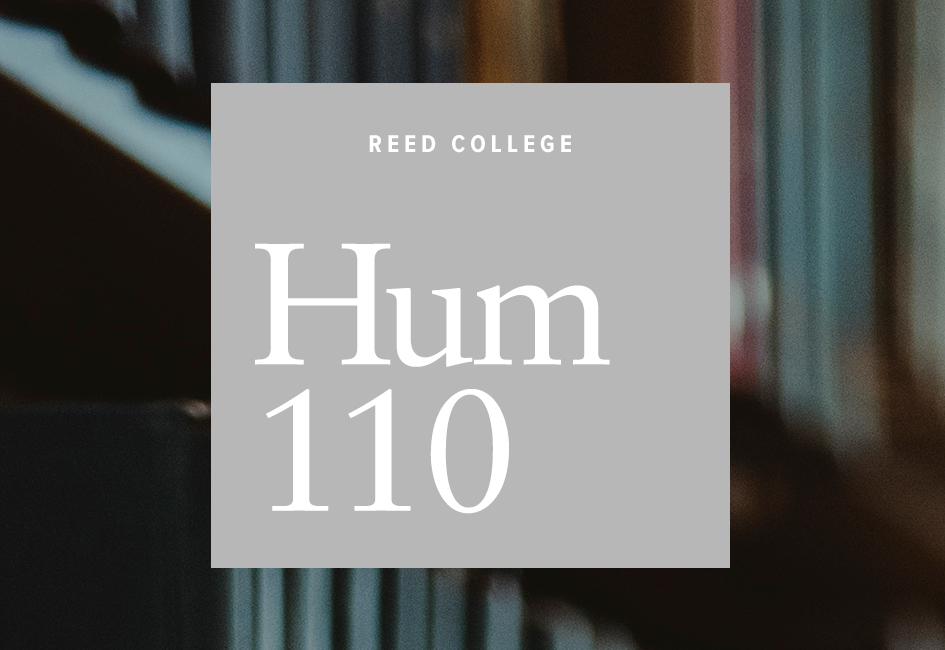Faculty Charts Bold New Course for Hum 110
New syllabus marks an important moment in the evolution of the class, says Dean of the Faculty.
Reed’s signature humanities course is moving beyond the ancient Mediterranean and coming to the Americas. The Reed faculty has approved a new course structure that includes two modules focused on the Americas with materials from the modern era.
The new course will be organized into four modules. Each will be centered on a set of humanistic problems framed geographically and temporally. The specific modules are designed to evolve over time. The new structure will begin fall 2018 with the ancient Mediterranean and Athens. Updates will proceed in the spring with new modules on Mexico City from the fifteenth through twentieth centuries and Harlem from 1919 to 1952.
The approval continues the active conversation on campus about how we approach humanistic studies in the twenty-first century. In 2016, the humanities faculty chose to accelerate the course’s regular 10-year review following campus protests that raised the issue of whether the syllabus, through its focus on the ancient Mediterranean, failed to give sufficient credit to traditionally marginalized voices. After conducting an extensive survey with students and alumni, inviting noted scholars to review the course, and meeting more than 30 times to discuss the syllabus, a majority of the Hum 110 faculty has approved the new model — the latest in an ongoing evolution of the course throughout Reed’s 110-year history.
“This new syllabus represents an enormous undertaking and commitment on the part of the Hum faculty and marks an important moment in the evolution of the class,” says Dean of the Faculty Nigel Nicholson. “I am excited to see the possibilities that will be opened up by the new areas and periods the class will be studying and by the dialogue that the class will foster between the Mediterranean and the Americas and between antiquity and the more recent past.”
Hum 110 will remain committed to its foundations as a unified year-long interdisciplinary course required for all first-year students that examines the ways in which people have represented and reflected on the physical, social, psychological, and ideological features of the world in which they live. The new model, however, offers a significant contemporary rethinking of both the scope and nature of humanistic inquiry that the Hum 110 faculty identified through the review process.
“It de-centers the material it presents, with no one module privileged over the other, and offers a defined historical sweep for each unit, thus encouraging students to understand the need for careful attention to historical particularity and context,” said Hum Chair and Professor of Spanish and Humanities Elizabeth Drumm during the April 9 faculty meeting. “It allows us to include a greater diversity of authors as well as texts written in a modern language that many students know well, including but not limited to English, and it allows for the development of modules that reflect areas of expertise of faculty recently hired at Reed as well as new areas of inquiry. In this sense, it allows for incremental revision one quarter of the year at a time.”
The Mexico City module, Constructions and Reconstructions, will explore how a city and its inhabitants have been represented through historical changes. This will start with the migration of the Mexica and their foundation of Tenochtitlán and then move through conquest and colonialism, the creation of the Mexican Republic, the Mexican Revolution, and into the indigenous peoples’ and students’ protests of the mid-to-late twentieth century.
The Harlem module, Aesthetics and Politics, Race, and Democracy, will begin with the movement of African Americans from the rural south to New York City as part of the Great Migration. It will then focus on the rich cultural and political flourishing that occurred in Harlem during the period between the two wars and its interaction with other minority discourses in New York during this time.
The Hum 110 faculty will host an open forum Wednesday, April 18, from 4:15 to 5:30 p.m. in the Gray Campus Center. Community members are invited to ask faculty questions about the new syllabus during this event. Refreshments will be served.
For those attending Reunions 2018, there will be a panel on Saturday morning about new majors and curriculum changes, including those affecting Humanities 110.
Tags: Academics, Diversity/Equity/Inclusion, Institutional, Professors
